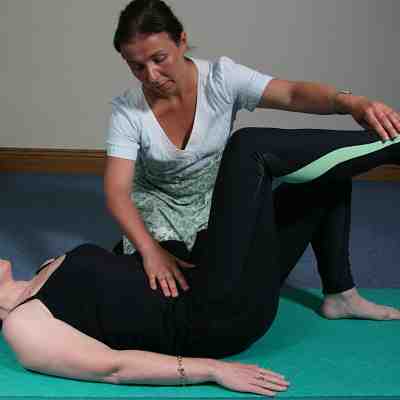Herniated Disc
Symptoms and Treatment Approaches
Have you been diagnosed with a herniated disc? It is useful to know just how a herniated disc occurs as well discover the various treatment options.
A herniated disc looks simple on paper - it is when disc material between two spinal vertebrae is pushed out of its normal position. In reality, the pain may be non-existent to very severe! People are sometimes surprised to hear that a herniated disc may cause no symptoms and have no effect on your life whatsoever.
It is, in fact, common for people to have some degree of disc herniation without symptoms. However, if your disc presses or impinges on your spinal cord or peripheral nerves, then you will likely need help, and this is one of the most common common conditions I see in my clinic.
In this section, we will look more closely at just what a herniated disc is - as well as discover more about the symptoms, treatments and exercises you should to to treat a herniated disc. .
Sponsored links
Herniated Cervical Disc »
Treatment of a herniated cervical disc will depend on the severity of the herniation as well as the degree of pain and symptoms that you are experiencing. Most cervical disc herniations can be treated effectively with mobilisation and strength therapy.
Herniated Disc Surgery Recovery »
Lets have a look at whats involved in recovering from herniated disc surgery. Firstly, it will depend on what type of disc surgery you had. It will depend on the extent of tissue removed and the condition of the remaining…
What is a Herniated Disc »
Also known as a slipped disc, the medical term is a herniated disc. This article provides a simple explanation of what a herniated disc and introduces how it is diagnosed, the symptoms and treatments available for a herniated disc.
Herniated Disc Symptoms »
There are many potential symptoms that you can expect if you have a herniated disc. The symptoms and the degree of the symptoms will depend on a number of factors, including where the herniated disc is and is it impinging…
Herniated Disc Treatment »
Your symptoms will dictate the treatment required for your disc herniation. As a physiotherapist working daily with herniated disc clients, I can tell you that there are many options of treatment for your herniated disc.
Herniated Disc Exercise »
Diagnosis is the key and although self treatment is often a good thing, when dealing with disc injuries I strongly advise seeing a professional and getting their help before you start exercises.
Herniated Lumbar Disc »
The most common area in your spine for herniation of a disc is in the lumbar spine. It is most common at the level of L5/S1, which is low down in your lumbar spine.
Herniated Disc in Neck »
A herniated disc is a very painful condition, particularly when it happens in your neck. This article, looks at what tends to cause them, and how recognising the signs and treating them can prevent it.
DISCLAIMER
While the content and materials contained in the articles on this website have been written & researched by Sally Ann Quirke, a professional, practising & fully qualified Chartered Physiotherapist (Physical Therapist) based in Ireland, they are provided for general information and educational purposes only. They do not constitute medical advice on any particular individual situation. Please see your Chartered Physiotherapist or other medical practitioner for full and individual consultation.
Please read the full disclaimer here.
Cookies and Privacy
By using this website, you consent to the use of cookies in accordance with our cookie policy. For more information on how we use cookies, please read our cookie policy here.







